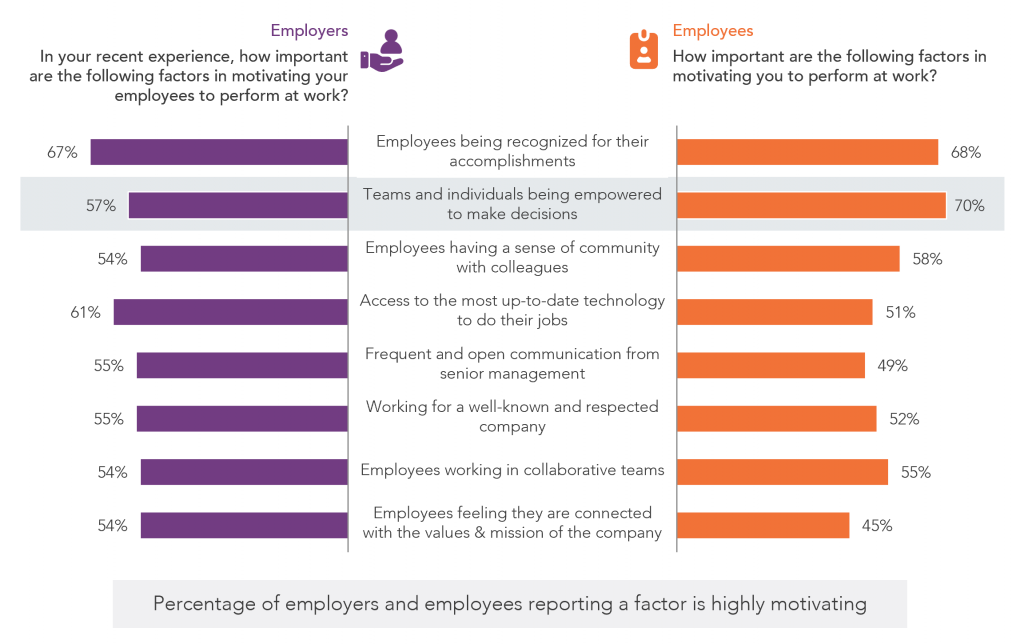Generative AI and other rapidly improving automation technologies could be exactly what is needed to give leaders the managerial—and emotional—capacity to handle the employee experience challenges of the Great Freakout of 2023. The bots don’t have the emotional capability to manage people through challenging times, but they can give you and your teams the time and space to apply empathy to the relationships, situations, and key decisions that will guide you to success.
Employers and employees are caught in the vortex of the Great Freakout as war rages, inflation spirals, banks collapse, and politicians offer little hope of stability. The reality is that managers must get closer to their teams to close the gap in their understanding of employee frustrations and motivations (see Exhibit 1), just at a time when the bedding-in of hybrid working as the business-as-usual way of working makes that harder than ever by limiting the time we co-locate.

Sample: Employers, n= 668; Employees, n= 1,333; from Surviving to Thriving in Hybrid Work, in partnership with Unisys, 2023
Source: HFS Research, 2023
There are clues to a solution in the HFS approach to the Autonomous Enterprise. When we declare that everything that could be automated should be automated, we must make employee experience just as high a priority for this treatment as customer or partner experience. We are already seeing examples where Generative AI—in particular, ChatGPT—plays a role. Recently EY revealed plans for applying ChatGPT to handle payroll inquiries, releasing HR teams from handling complex but mundane and time-consuming queries.
Digital adoption platforms such as Walkme and digital employee experience offerings such as Nanoheal are already busily keeping teams up to speed with the rollout of wave upon wave of new applications (in the case of the former) and automating out much of the daily employee frustration of technology fails (in the latter).
When we choose to automate out the drudgery of work, we give ourselves and our people the time to be our emotional best, applying empathy to our relationships, situations, and decision-making.
Empathy is a human characteristic that we apply specifically, situationally, and uniquely. What some are calling empathy in AI (here, for example, ChatGPT has aced empathy) is more an example of AI being trained to say a generic “right thing.” Automatically firing out calming, one-size-fits-all phrases is not the same as being empathetic.
This is why teachers, healthcare professionals, and, yes, you team managers and leaders, you can all sleep well. AI is not about to replicate or replace our most human characteristics. But it is a powerful tool to give us more time to emphasize those characteristics. That is what we should take advantage of. Don’t replace how you manage—enhance it.
Humans are great at nuancing how we give and receive feedback, for example. It’s why making the effort to get face-to-face still pays off. We can read how someone responds and respond accordingly. Our feedback loops are instant and unique for the individual before us. But we need to create the time to focus on making those human connections with our teams. The drive to the autonomous enterprise and automating everything that should be automated does not mean humans should be taken out of every loop. AI can be left to make trivial, daily, tactical, and reactive decisions, allowing us more time to use our emotions to guide smarter choices on the decisions that matter. This extends to the choices we make to deliver the employee experience we provide to our teams.
If you’re tempted to get ChatGPT to generate a motivational email to send-to-all, don’t. Instead, focus on making your organization more autonomous to provide your people—and yourself—with the time to act less like machines when making decisions.
Humans come with baggage when it comes to decision making. But if we understand our emotions, they can prove beneficial in ways AI cannot (yet) replicate. For example, if all things appear equal, our emotional response may tip the balance in favor of one choice. Experts believe we trust ourselves in these moments because our “gut feelings” are the encoding and compacting of the sum of our experiences. We don’t completely understand how this happens, so we are not close to replicating this through computation. Emotions are effectively our subconscious sending us signals—something way beyond the capabilities even of ChatGPT 4.5!
We may make decisions out of anger, pity, sorrow, or even love, that conflict with our self-interests. That may seem illogical (and your AI would reject them), but they often prove right. This may be because, according to the Annual Review of Psychology (Volume 66, 2015), “emotions influence the depth of information processing related to decision making.” In other words, our deliberations are deeper when our emotions are engaged.
Employee experience has many facets, from the hardware and software you provide to employee alignment with corporate “purpose.” But the one unchanging fundamental is that an employee’s experience is influenced to the greatest degree by the small group of people they regularly connect and work with. As the world of work becomes increasingly automated, line managers from top to bottom must be empowered and rewarded to automate the drudgery of work to give themselves and their teams the time to be increasingly human and more emotionally involved.
Register now for immediate access of HFS' research, data and forward looking trends.
Get StartedIf you don't have an account, Register here |
Register now for immediate access of HFS' research, data and forward looking trends.
Get Started